Parts of Speech
- What is a noun?
- A noun is a person, place, thing or idea
- What are some examples of nouns?
- Dancer (person)
- Street (place)
- Lamp (thing)
- Freedom (idea)
- How is a proper noun different?
- A proper noun is a noun that is specific to one person, place, thing or idea. In short, a proper noun is a name.
- Mrs. Etter (person)
- Winnetka (place)
- Snuggie (thing)
- What is a pronoun?
- A pronoun is a word that takes the place of a noun in a sentence.
- What are some examples of pronouns?
- What does that look like in a sentence?
- Mrs. Etter went to lunch.
- She went to lunch.
- What is a verb?
- A verb is a word that identifies an action, movement or state of being.
- What are some examples of verbs?
- What about the forms of “to be”? Example: is, was, were & are.
- Yes, these are verbs. They all describe a state of being and are therefore verbs
- Example: Sam is nice
- What about odd ones like “will”, “shall”, “could”, “would”, “must”, “may”, “might”, etc?
- Yes, these are also verbs. They are called “modal verbs” and are usually seen helping another verb along.
- Example: I think we will go to the party.
- What are the verbs in this sentence?
- What is an adjective?
- An adjective is a word that modifies or describes a noun. In other words, it is a word that makes a noun more specific.
- What are some examples of adjectives?
- Which of the following words are adjectives?
- The dancing, purple dog sat beside his house
- What is an adverb?
- An adverb is a word that is used to modify (further describe) a verb, adjective or other adverb.
- What are some examples of adverbs?
- Which of the following words are adverbs?
- The sun often rises above the extremely green horizon, very rapidly casting an orange glow over the world.
- What is a preposition?
- Shows a relationship, often physical, spatial or concerning time, between two nouns or pronouns in a sentence.
- What are some examples of prepositions?
- Which of the following words are prepositions?
- The cat went to the store. The store was past the park. He passed over the bridge on his way.
Preposition
- What is a conjunction?
- A word that is used to join words, phrases or clauses.
- What are some examples of conjunctions?
- Which of the following words are conjunctions?
- The hunter and his friend went camping because they enjoy the outdoors. They paid for the campsite ahead of time so that they could reserve it. It was either that or just show up and hope for the best.
Conjunction
- What is an interjection?
- An interjection is a single word that is used to express emotion. It is usually separated from the sentence by an exclamation point or a comma.
- What are some examples of interjections?
- Which of the following words are interjections?
- Ow! You stepped on my toe!
- Eek! I saw a mouse!
- Hey, do you know when class starts tomorrow?
interjection
- What is an article?
- An article is a word that identifies or specifies a noun. It proceeds the noun in a sentence.
- What are some examples of articles?
- There are only three articles:
- Which of the following words are articles?
- The cat sat beside a river and caught a fish.
Identify each word in the sentence by its correct part of speech
The cat ran quickly down the stairs
Article noun verb adverb preposition article noun
What parts of speech do we have here?
Beside the lake sat the beautiful princess.
Preposition article noun verb article adjective noun
Carol and Lisa were laughing at his haircut.
Proper noun conjunction proper noun verb verb preposition adjective noun
Ugh! You are so mean!
Interjection Pronoun verb adverb adjective
The very angry teacher slammed her books on the table.
Article adverb adjective noun verb adjective noun preposition article noun
Who was spreading that rumor?
Pronoun verb verb adjective noun
Everyone went to the party but me.
Pronoun verb preposition article noun conjunction pronoun.
My house is between the slowly flowing river and the school.
Adjective noun verb preposition article adverb adjective noun conjunction article noun
Someone was calling your phone.
The black car was somewhat noisy and old.
Article adjective noun verb adverb adjective conjunction adjective.
She was standing against the wall.
Pronoun verb verb preposition article noun
What are we having for dinner?
Pronoun verb pronoun verb preposition noun
They always arrive before noon.
Pronoun adverb verb preposition noun
She and I went to the store on Tuesday.
Pronoun conjunction pronoun verb preposition article noun preposition Proper noun
I had a very scary dream about you.
Pronoun verb article adverb adjective noun preposition pronoun
Jenny nor Sally could come to the dance.
Proper noun conjunction proper noun verb verb preposition article noun.
We sometimes go there after school.
Pronoun adverb verb noun preposition noun
- International
- Schools directory
- Resources Jobs Schools directory News Search
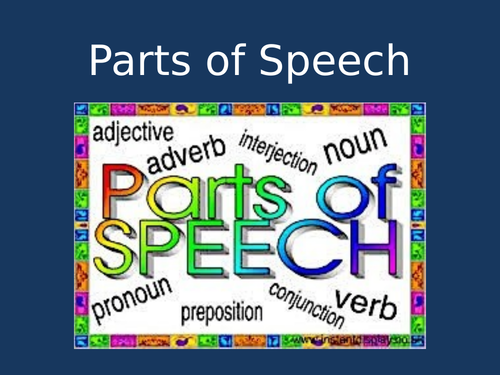

Parts of Speech PowerPoint
Subject: English
Age range: 11-14
Resource type: Lesson (complete)
Last updated
8 February 2022
- Share through email
- Share through twitter
- Share through linkedin
- Share through facebook
- Share through pinterest

Teaching parts of speech? Help your students reach proficiency with this comprehensive, instructional 21-slide PowerPoint. Presentation addresses all eight parts of speech, including: nouns, verbs, pronouns, prepositions, adjectives, adverbs, conjunctions, and interjections - with examples and kid-friendly pictures.
Assess your students with a formative/summative review that will let you know their comprehension level. Easy for you - engaging for them!
Tes paid licence How can I reuse this?
Get this resource as part of a bundle and save up to 17%
A bundle is a package of resources grouped together to teach a particular topic, or a series of lessons, in one place.
Parts of Speech Bundle
Teaching parts of speech? Teach, practice, and assess this important literacy skill with the Parts of Speech PTA Skills Bundle! The PTA Skills Bundle includes three research-based, best practice products that allow for instruction, practice, and assessment: PowerPoints - 22 slides Task Cards - 40 Task Cards Assessment - 30-question test with answer key About PTA Skills Bundles: The Guaranteed-To-Succeed PTA Skills Bundles includes three research-based, best practice products (PowerPoint, Task Cards, and Assessment) that allow for instruction, practice, and assessment – the three most important components of your lesson. PTA Bundles are an all-inclusive easy way to teach skills and concepts while reaching 100% student engagement and proficiency in no time. Here’s how it works: 1) You TEACH the skill with an easy-to-understand, comprehensive instructional PowerPoint. 2) Students PRACTICE the skill as they review the content with high yield Task Cards that generate active engagement. 3) You ASSESS the skill with a Common Core-aligned assessment that will let you know in no time who is advanced, proficient, basic, and below basic. Need more products for all your literacy lessons? Check out the PTA ELA Skills Jumbo Bundle - Volume 1 and PTA ELA Skills Jumbo Bundle - Volume 2 for an entire year of resources! 10 Benefits of the PTA Skills Bundle: ➢PTA Bundles are instructional time-friendly! ➢PTA Bundles are perfect for standout evaluations. You’ll shine as your evaluator commends your use of materials, creativity, content, and assessment. ➢PTA Bundles are minimal prep work…it’s all there! ➢PTA Bundles include Common Core-aligned assessments will let you know in no time who is advanced, proficient, basic, and below basic in this important ELA skill. ➢PTA Bundles are time savers…they last for years! ➢PTA Bundles include research-based high yield strategies that keep students actively engaged. ➢PTA Bundles are super sub friendly…Keep them learning even when you’re not there! ➢PTA Bundles have built in standardized test prep, so no need to stress come spring! ➢PTA Bundles make collaboration easy. Share the wealth of your knowledge and resources with your colleagues the easy way. ➢PTA Bundles are Easy for you – Engaging for them!! Add PTA Skills Bundles to your teaching library today!
Your rating is required to reflect your happiness.
It's good to leave some feedback.
Something went wrong, please try again later.
This resource hasn't been reviewed yet
To ensure quality for our reviews, only customers who have purchased this resource can review it
Report this resource to let us know if it violates our terms and conditions. Our customer service team will review your report and will be in touch.
Not quite what you were looking for? Search by keyword to find the right resource:

- My presentations
Auth with social network:
Download presentation
We think you have liked this presentation. If you wish to download it, please recommend it to your friends in any social system. Share buttons are a little bit lower. Thank you!
Presentation is loading. Please wait.
To view this video please enable JavaScript, and consider upgrading to a web browser that supports HTML5 video
The Eight Parts of Speech
Published by Anthony Stokes Modified over 10 years ago
Similar presentations
Presentation on theme: "The Eight Parts of Speech"— Presentation transcript:
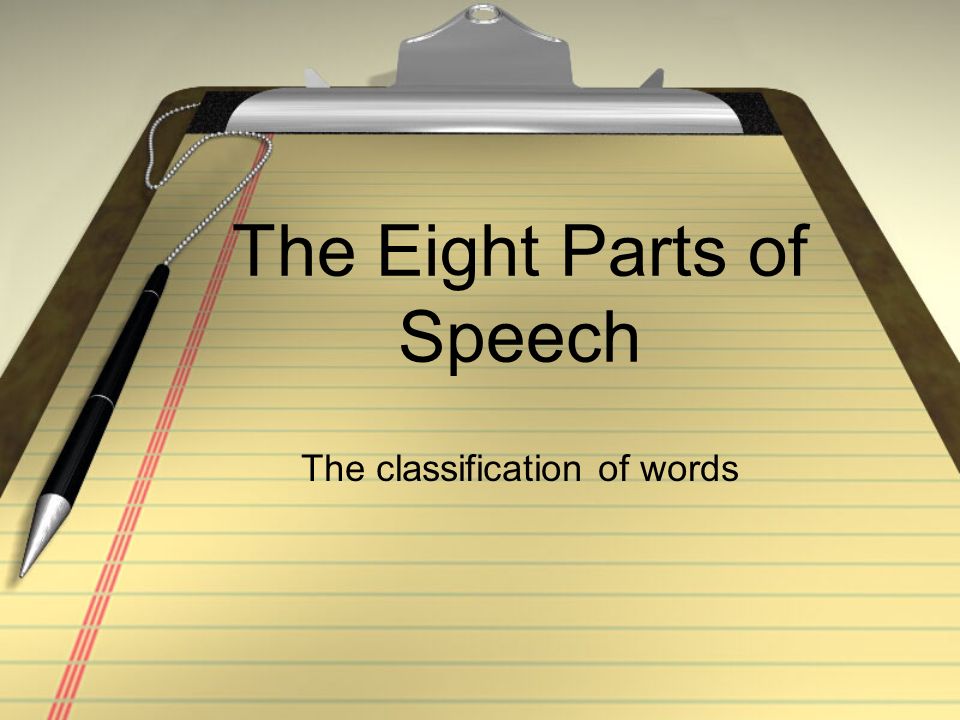
English Grammar Parts of Speech.

English Grammar Grades 9-12

8 Parts of Speech Noun Pronoun Adjective Verb Adverb Preposition Conjunction Interjection.

English Grammar PARTS OF SPEECH Eight Parts of Speech Nouns Pronouns Adjectives Adverbs Conjunctions Prepositions Verbs Interjections.

English Grammar PARTS OF SPEECH.

Parts of Speech.

About project
© 2024 SlidePlayer.com Inc. All rights reserved.
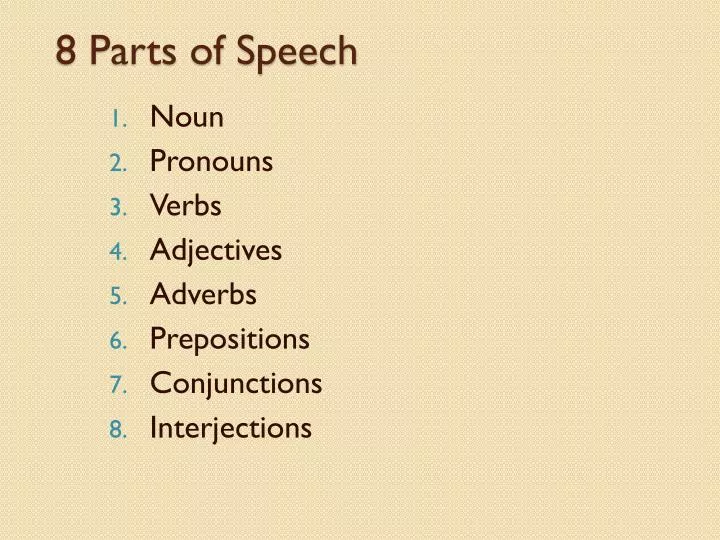
8 Parts of Speech
Oct 03, 2014
570 likes | 896 Views
8 Parts of Speech. Noun Pronouns Verbs Adjectives Adverbs Prepositions Conjunctions Interjections. Nouns (p. L39). A noun is the name of a person, place, thing, or idea. Nouns answer the who or what in the sentence. There are 6 types of nouns:
Share Presentation
- linking verbs
- verb practice
- helping verbs
- linking verb practice
- complete pronoun verbs handouts

Presentation Transcript
8 Parts of Speech Noun Pronouns Verbs Adjectives Adverbs Prepositions Conjunctions Interjections
Nouns (p. L39) A noun is the name of a person, place, thing, or idea. Nouns answer the who or what in the sentence. There are 6 types of nouns: 1. concrete – name people, places, and things you can usually touch or see 2. abstract – name ideas & qualities 3. common – names any person, place, or thing 4. proper – names a particular person, place or thing (ALL proper nouns begin with a capital letter) 5. compound – noun that includes more than one word; EX. living room, home run, break-in, birdhouse, crosswalk 6. collective – names a group of people or things; EX. band, committee, league, family
Pronouns (p. L47) A pronoun is a word that takes the place of one or more nouns. Personal Pronouns: 1st person – I, me, my, mine, we, us, our, ours 2nd person: you, your, yours 3rd person: he, him, his, she, her, hers, it, its, they, them, their, theirs
Pronoun Antecedents A pronoun antecedent is the noun a pronoun refers to or replaces in a sentence. Ex. Dion said he couldn’t go to the zoo. Pronoun = he Pronoun antecedent = Dion
Pronoun Practice p. L47-48 • Juanita brought her camera on the trip to the zoo. • Steve asked Juanita to take a picture of him. • Linda said, “I enjoy the reptiles.” • Gretchen and Margo said they were looking for the penguins. • Ms. Jackson told Henry that she liked to watch the monkeys.
Pronouns (cont’d) Reflexive/Intensive pronouns refer to or emphasize another noun or pronoun. EX: myself, yourself, himself, herself, itself, ourselves, yourselves, themselves Indefinite pronouns refer to unnamed people, places, things or ideas. EX: another, anybody, anyone, anything, each, either, everybody, everyone, everything, much, neither, nobody, no one, one, somebody, someone, something, both, few, many, others, several, all, any, most, none, some
Pronoun Practice p. L52-53 • In the early 1840s, adventurous settlers readied themselves for the overland trip to the West. • Life in the Oregon country held new promise for them. • The settlers themselves could never have anticipated all the hardships they encountered on the two-thousand mile Oregon Trail.
Pronouns (cont’d) Demonstrative pronouns point out a specific person, place, thing, or idea. EX. this, that, these, those Interrogative pronouns are used to ask questions. EX. what, which, who, whom, whose
Pronoun Practice p. L57 • Who is going to the dance on Saturday? • That is the most important question on our minds. • This is my outfit for the dance. • Of all my shoes, these will match my dress best. • What is the first song going to be?
Verbs p. L69 • A verb is a word that expresses action or a state of being. • An action verb tells what action a subject is performing. • Action verbs show physical and mental action or show ownership
Verbs p. L69 • A verb phrase includes a main verb plus any helping, or auxiliary, verbs. • Ex. The whales will have migratedby October. • The students couldcertainly learn more about the sea. • Should our class visit the ocean? • I have never seen a killer whale.
Helping Verbs p. L70 • There are 23 most common helping verbs. • be: am, is, are, was, were, be, being, been • have: has, have, had • do: do, does, did • Others: may, might, must, can, could, shall, should, will, would
Verb Practice p. L70-71 • Dr. Lilly, a scientist from California, has been experimenting with dolphins for many years. • He has made some curious claims about them. • Dolphins have larger brains than humans. • Their language contains at least fifty thousand words.
Verb Practice p. L71 5. Their brains can handle four different conversations at one time. 6. They can also judge between right and wrong. 7. Dolphins can remember sounds and series of sounds. 8. They can even communicate among themselves.
Linking Verbs (“to be” verbs) p. L75 • A linking verb links the subject with another word in the sentence. The other word either renames or describes the subject.
Common Forms of Be • Be, is, am, are, was, were • Shall be, will be, can be, could be, should be, would be, may be, might be • Have been, has been, had been, could have been, should have been, may have been, might have been, must have been
Additional Linking Verbs p. L76 • Appear • Become • Feel • Grow • Look • Remain • Seem • Smell • Sound • Stay • Taste • Turn
Linking Verb Practice p. L76-77 My childhood on the farm was great. Childhood memories should be happy for everyone. My mother had been a city girl. My father could have been a doctor. Instead, he was a farmer.
Linking Verb Practice p. L77 • The weather suddenly turned colder. • The sky looks dark today. • The clouds have grown thicker. • The gentle breeze became a strong wind. • The raindrops felt cold against my skin. • The dog appeared quite upset. • The thunder sounded very loud.
Homework • Complete Pronoun & Verbs handouts • Due Tuesday
Adjectives/Adverbs
ADJECTIVES P. L91 – L101 • Word that modifies a noun or pronoun • Describing words • Questions adjectives answer: • What kind? • Which one(s)? • How many? • How much?
Adjectives cont’d • Articles are also adjectives: a, an, the • Pronouns may be used as adjectives • Ex. I think her graphic will certainly win a prize. • Demonstrative, interrogative and indefinite pronouns can act as adjectives. • In order for these pronouns to be adjectives, a noun must follow the pronoun. • Ex. These boots are too large for me. (Adjective) • Ex. These are too large for me. (Pronoun)
Adjective practice Laura bought a blue blouse with white trimmings. Several athletes complained about the old stadium.
ADJECTIVE EXAMPLES 3. The writer, tall and impressive, entered the auditorium. 4. Each one in the class will develop an original project.
ADJECTIVE PRACTICE 5. This short story by Pearl Buck has a surprise ending. 6. If you are interested, I will show you my camera.
ADVERBS P. L104-L110 • Modify adjectives, verbs, and other adverbs • Questions adverbs answer: • Where? • When? • How? • To what extent? • Many end in –ly; however, many do not. (See chart p. L 104) • Ex. Afterward, almost, alone, fast, hard, here, just, too, very, well, rather, sometimes, somewhere
Adverb Examples 1. At the debate, you must speak clearly. 2. I almost finished my homework in an hour.
Adverb Examples 3. I have often wondered about her past. 4. We have changed our minds completely.
Adverb Examples 5. Our team plays hard. 6. I am not surprised.
Adjective & Adverb Homework October 19th Assignment: • In BK grammar book: • P. L92-L93 (1-10) • P. L95-96 (1-12) • P. L97-L98 (1-10) • P. L101 (1-10) • P. L110-L111 (1-20) Due Friday, October 23rd • If you are struggling with these exercises, you need to attend BLAST. Remember, BLAST is offered Monday – Thursday in room 142
PREPOSITIONS p. L125-L131 • A word that shows the relationship between a noun or a pronoun and another word in the sentence • EX. The letter to Lori was lost. • Preposition = to • Shows a relationship between Lori and the letter • Review list of prepositions on p. L125 • EX. The letter to Lori was lost. • Preposition = to • Shows a relationship between Lori and the letter
4 Uses of Prepositions • Location: Many prepositions tell where something is in relation to something else. Example: The cat hid under the tree. Other popular prepositions that show location are: in, on, inside, above and near.
4 Uses of Prepositions 2. Direction/Action: Other prepositions tell where something is going. Example: The car drove to the café. 3. Time: A few prepositions help to tell time in a sentence. Example: During the race, Bob’s shoelace came untied.
4 Uses of Prepositions 4. Relationship: Other prepositions show the relationship between a noun (or pronoun) and another word. Example: That poem was written by Edgar Allen Poe.
Prepositions • A preposition that is made up of two or more words is called a compound preposition. • Review list of common compound prepositions on p. L126.
Prepositional Phrases p. L127 • A prepositional phrase begins with a preposition and ends with a noun or a pronoun (object of the preposition). • EX. England is the setting of this suspenseful mystery. • Preposition = of • Noun = mystery • Prepositional phrase = of this suspensefulmystery
Preposition Practice • I placed the lawn mower in a corner of the garage. • During the spring, I often visit a flower show.
Preposition Practice • A man from the IRS called father at home. • She finally agreed in spite of her original protests.
Preposition Practice • Father is not terribly worried about them. • A group of students demonstrated in front of the building.
Homework (due Tuesday) • Complete “Preposition Practice” handout • Grammar quiz over all parts of speech Friday, 11/14
CONJUNCTIONS p. L132 • Connects words or groups of words • 2 types: coordinating & correlative
Coordinating Conjunctions • FANBOYS: For And Nor But Or Yet So
Correlative Conjunctions • Pairs of connecting words • Both/and • Either/or • Neither/nor • Not only/But so • Whether/or
INTERJECTIONS p. L135 • A word that expresses strong feeling or emotion • Followed by an exclamation point (!) or comma (,) • Express feelings such as joy or anger • Generally at the beginning of a sentence • Ex. Oh, did you see that pass? • Interjection = Oh
Parts of Speech Review
- More by User
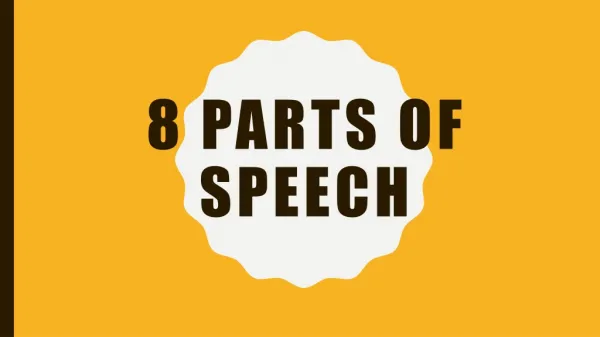
8 Parts of Speech. Today we will. Objective Acquire and use academic and domain-specific words (7.L.6 ). Rationale We need to be able to apply knowledge of language to understand how language functions in different contexts. How : View a PowerPoint/take notes AZ.7.W.4.
782 views • 15 slides

8 Parts of Speech. The Building Blocks of ELA. 8 Parts of Speech. Nouns Pronouns Adjectives Verbs Adverbs Prepositions Conjunctions Interjections. The 3 “tions”. Names a Person Place Thing Idea. Examples: Mary, girl, neighbor New York, town, city food, school, house, fox
940 views • 42 slides
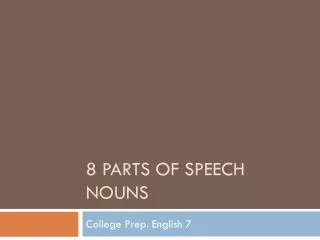
8 Parts of Speech Nouns
8 Parts of Speech Nouns. College Prep. English 7. What is a pronoun?. A pronoun is a word used in place of one or more nouns or pronouns: An antecedent is the word or word group that is replaced by the pronoun Examples: John is kind; he is also funny. Samantha , where is your book?
293 views • 8 slides
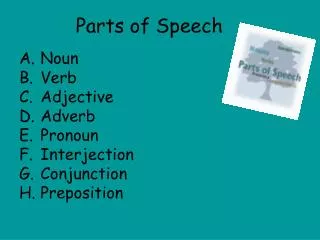
Parts of Speech
Parts of Speech. Noun Verb Adjective Adverb Pronoun Interjection Conjunction Preposition.
850 views • 1 slides

Parts of Speech. Noun Pronoun Verb Adverb Adjective Preposition Conjunction Interjection. Noun. A noun is a word that names a person, place, a thing, or an idea in your writing. Person: students, secretary, Bob, Janet Place: city, sky, Texas, FCMS
2.48k views • 16 slides

Parts of Speech. Nouns, Pronouns, Verbs, Adjectives, Adverbs, Conjunctions, Prepositions, Interjections. Nouns. Person, place, thing, idea Concrete nouns – can be perceived with at least one of the five senses (rock, salt, scream)
2.39k views • 51 slides

8 Parts of Speech. Eng1D. Adjective. Preposition. Pronoun. Noun. Verb. Adverb. Interjection. Conjunction. Noun. A noun is a word used to name a person, place, thing, animal, or abstract idea. In the following sentence all of the yellow words are nouns:
409 views • 20 slides
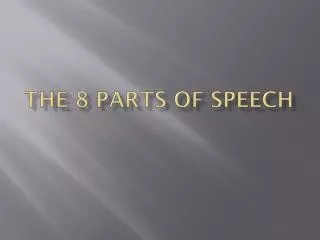

The 8 Parts of Speech
The 8 Parts of Speech. 1. NOUNS. A noun is a word that names…. people. places. things. and ideas. Nouns can be divided into two categories: 1. Concrete Nouns 2. Abstract Nouns. Concrete nouns. name people, places, and things that you can see and touch. Abstract Nouns.
867 views • 73 slides

ADVERBS. INTERJECTIONS. Noun. The 8 Parts of Speech. PRONOUNS. CONJUNCTIONS. PRPOSITIONS. ADJECTIVES. VERB. NOUNS. Nouns name persons, places, things, or concepts pilot house toy happiness Proper name specific persons, places things, or concepts Bill Iowa Supreme Court Buddhism
402 views • 18 slides

8 Parts of Speech. Concrete Nouns Abstract Nouns Common Nouns Proper Nouns Compound Nouns. Nouns . Grammar Rocks: Nouns. Wanna Live Forever? Become a Noun. Noun relay: Start with a noun (kangaroo) Next person has to say a noun using the last letter of the previous word orange. . Action
241 views • 9 slides
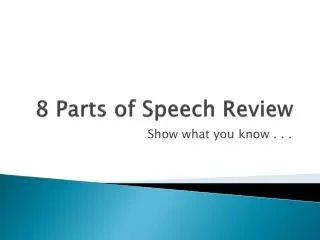
8 Parts of Speech Review
8 Parts of Speech Review. Show what you know . . . Nouns. Types of Nouns: Collective Compound Common Proper. How would you classify the underlined noun in the following sentences?. James Patterson is easily one of my favorite authors. proper
468 views • 17 slides

Parts of Speech. Nouns. Function : To name a person, place, thing, or idea Examples : . Function : To show action or state of being Examples :. Verbs. Action Verbs Run Walk Laugh Hug Write Watch Study Play Talk. Linking Verbs is am are was
1.25k views • 9 slides

8 Parts of Speech. For your homework last night, you had to write a list of words that matched the indicated part of speech (noun, verb, adjective, or adverb). Using your list, fill in the madlib below.
472 views • 17 slides

8 Parts of Speech. Look at the phrases listed below. Unscramble the parts so that you have a sentence written in the correct order. THEN, label all the nouns by underlined them and verbs by circling them, and place and ADJ above and Adjectives, and ADV above the adverbs.
358 views • 7 slides

Parts of Speech. Noun (25) Pronoun (31) Adjective (38) Verb (51) Adverb (61) Preposition (66) Conjunction (69) Interjection (71). How to Find Subject/Verb/DO/IO. Step 1: Find the Verb Step 2: Find the Subject Step 3: Find the DO (if there is one) Step 4: Find the IO (if there is one)
904 views • 8 slides

The 8 Parts of Speech. Common Nouns: Words that name a person, place, or thing. The cow jumped over the moon . We celebrated my birthday with a great, big, chocolate cake . Shawn cut the grass. Shawn Cut grass. Proper Noun: A specific person, place, or thing.
336 views • 24 slides

8 Parts of Speech. You have already learned nouns, verbs, adjectives, and adverbs. Let’s see if you are familiar with the other four parts of speech: prepositions, conjunctions, pronouns, and interjections.
643 views • 6 slides

8 Parts of Speech. 9th Grade English by: Melissa Rosloniec. Learning Objective. In this lesson, we will be learning about the 8 parts of speech. You will learn the definitions, and be able to identify the different parts of speech in examples and sentences. (Standard 3001.1.1)
8.19k views • 41 slides

8-Parts of Speech:
8-Parts of Speech:. Bob Marley Style. Media Used. Portable CD player Compilation disc of burned songs Map of the Caribbean Pictures of Bob Marley Pictures of Caribbean Culture. Determine the 8 Parts of Speech. Multicultural Groups of 4 or 5 Students listen to music with lyrics
288 views • 9 slides
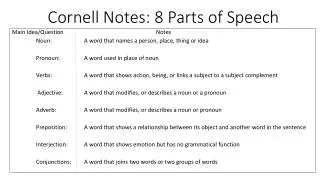
Cornell Notes: 8 Parts of Speech
Cornell Notes: 8 Parts of Speech. Main Idea/Question Notes Noun: A word that names a person, place, thing or idea Pronoun: A word used in place of noun Verbs: A word that shows action, being, or links a subject to a subject complement
228 views • 6 slides

8 Parts of Speech. The Student Approach. The 8 Parts of Speech. Interjection Verb Adjective Noun Conjunction Adverb Pronouns Preposition. Nouns . Nouns are very easy to spot. A noun is a word that names a person, place, thing, or idea.
419 views • 13 slides

- Share on Facebook
- Tweet This Resource
- Pin This Resource

8 Parts of Speech
This 8 parts of speech ppt also includes:.
- Graphic & Image
- Join to access all included materials
Review the basics when it comes to grammar. Each slide provides learners with examples and definitions of one of the eight parts of speech. A great resource to keep handy for review, to clear up confusion, or to introduce the topic. Adverbs, pronouns, verbs, interjections, conjunctions, prepositions, nouns, and adjectives - they're all here!
Start Your Free Trial
Save time and discover engaging curriculum for your classroom. Reviewed and rated by trusted, credentialed teachers.
- Collection Types
- Activities & Projects
- Assessments
- Graphics & Images
- Handouts & References
- Interactives
- Lab Resources
- Learning Games
- Lesson Plans
- Presentations
- Primary Sources
- Printables & Templates
- Professional Documents
- Study Guides
- Instructional Videos
- Performance Tasks
- Graphic Organizers
- Writing Prompts
- Constructed Response Items
- AP Test Preps
- Lesson Planet Articles
- Online Courses
- Interactive Whiteboards
- Home Letters
- Unknown Types
- Stock Footages
- All Resource Types
See similar resources:
Change the verbs to adverbs, present tense, adverbs of frequency, action verbs, the nine parts of speech, parts of speech review, non-action verbs, state of being verbs, verbs - what is a verb, parts of speech.
Purdue Online Writing Lab Purdue OWL® College of Liberal Arts
Welcome to the Purdue Online Writing Lab

Welcome to the Purdue OWL
This page is brought to you by the OWL at Purdue University. When printing this page, you must include the entire legal notice.
Copyright ©1995-2018 by The Writing Lab & The OWL at Purdue and Purdue University. All rights reserved. This material may not be published, reproduced, broadcast, rewritten, or redistributed without permission. Use of this site constitutes acceptance of our terms and conditions of fair use.
The Online Writing Lab at Purdue University houses writing resources and instructional material, and we provide these as a free service of the Writing Lab at Purdue. Students, members of the community, and users worldwide will find information to assist with many writing projects. Teachers and trainers may use this material for in-class and out-of-class instruction.
The Purdue On-Campus Writing Lab and Purdue Online Writing Lab assist clients in their development as writers—no matter what their skill level—with on-campus consultations, online participation, and community engagement. The Purdue Writing Lab serves the Purdue, West Lafayette, campus and coordinates with local literacy initiatives. The Purdue OWL offers global support through online reference materials and services.
A Message From the Assistant Director of Content Development
The Purdue OWL® is committed to supporting students, instructors, and writers by offering a wide range of resources that are developed and revised with them in mind. To do this, the OWL team is always exploring possibilties for a better design, allowing accessibility and user experience to guide our process. As the OWL undergoes some changes, we welcome your feedback and suggestions by email at any time.
Please don't hesitate to contact us via our contact page if you have any questions or comments.
All the best,
Social Media
Facebook twitter.
We asked a parasite expert about RFK Jr.'s claim that a worm ate his brain. Here's what they said.
- Did a worm eat Robert F. Kennedy Jr.'s brain?
- The third-party presidential candidate said in a 2012 deposition that a doctor suggested a parasite hurt him.
- We spoke to an expert, who said a brain-eating tapeworm larvae would be impossible.

Brain-eating worms? Not likely.
A shocking report in The New York Times on Wednesday revealed that independent presidential candidate Robert F. Kennedy Jr. suggested in a 2012 deposition that doctors had found a dead worm in his brain.
In the court proceeding — part of his divorce from his second wife — Kennedy said that he had short-term and long-term memory loss, according to The Times.
Kennedy said he had visited doctors in 2010 who thought he had a brain tumor, but another doctor suggested that a dark spot on Kennedy's brain scan was "caused by a worm that got into my brain and ate a portion of it and then died," The Times reported.
Kennedy argued in the deposition that he couldn't make as much money due to his health, and also revealed that he had mercury poisoning around the same time.
Kennedy has portrayed himself as the younger, more healthy alternative to the other two men running for president, Joe Biden and Donald Trump.
His campaign's press secretary confirmed that Kennedy was infected with a parasite 10 years ago and said it was resolved. His campaign told Business Insider that Kennedy is in "robust physical and mental health" and said questioning his fitness is a "hilarious suggestion, given his competition."
Related stories
But could a parasitic worm even cause that kind of damage? One medical expert told Business Insider that Kennedy's version of events doesn't quite add up.
Dr. Janina Caira, a University of Connecticut professor and tapeworm specialist, told BI that Kennedy's parasite sounds more like the larvae of a pork tapeworm.
That would be rare, Caira said in an email. Humans can be infected with the adult worm by eating undercooked pork, but can only be infected with the larvae after eating food or drinking water contaminated by the feces of someone with an adult tapeworm infection.
"This typically happens in areas with poor sanitation," Caira said. "So, it is possible that he could have contracted the infection in South Asia if he came into contact with food or water contaminated with eggs of the tapeworm."
But there's no way the larvae could have consumed Kennedy's brain tissue.
"Absolutely not," Caira wrote.
She said the larvae don't have mouths or digestive systems. Instead, they absorb nutrients through the surface of their bodies. While Caira said it is possible that a worm could do some "mechanical damage" to nearby brain tissue, the larvae are very small, and a single one "would not cause much damage."
That lines up with what experts, who were skeptical of the details, told The New York Times.
However, Dr. Peter Hotez, a pediatrician and global health advocate who is a professor of pediatrics and molecular virology & microbiology at Baylor College of Medicine, wrote on X that "neuroparasitic diseases" and "parasitic worms have a huge impact on the human brain."
Hotez said the diseases are seen in poor populations, with a "surprising amount of illness" in southern states and Texas. He said his team at the National School of Tropical Medicine is working on low-cost vaccines to prevent the conditions.
Watch: McConnell freezes again, raising concern for the 81-year-old Senator's health
- Main content

COMMENTS
Adjective required as you will come to each page as you progress 4. Verb through the PowerPoint. 5. Adverb 6. Conjunction 7. Preposition 8. Interjection. 4. A noun is a person, place, The bakery has thing, or idea. fresh baked goods. Nouns are the subject of a sentence. Kylie is a pro-golfer.
Parts of Speech Grammar Review/ Introduction. 8 parts of speech • Noun • Pronoun • Verb • Adjective • Adverb • Conjunction • Preposition • Interjection. What are parts of speech? • Definition: words that label the various kinds of words in a sentence • A word's meaning & position in a sentence determine what part of speech it is.
8 main parts of speech explained with homework. For B1-B2 Levels. There are eight main parts of speech (also known as word classes): nouns, pronouns, adjectives, verbs, adverbs, prepositions, conjunctions and interjections. Most parts of speech can be divided into sub-classes. Prepositions can be divided into prepositions of time, prepositions of place etc. Nouns can be divided into proper ...
They all describe a state of being and are therefore verbs. Example: Sam is nice. What about odd ones like "will", "shall", "could", "would", "must", "may", "might", etc? Yes, these are also verbs. They are called "modal verbs" and are usually seen helping another verb along. Example: I think we will go to the party.
Learning Objective • In this lesson, we will be learning about the 8 parts of speech. You will learn the definitions, and be able to identify the different parts of speech in examples and sentences. (Standard 3001.1.1) 1.Noun 4.Adjective 7.Conjunction 2.Verb 5.Adverb 8.Interjection 3.Pronoun 6.Preposition. Directions Click this button to go ...
Download ppt "The Eight Parts of Speech". 8 Parts of Speech 1. Nouns 2. Pronouns 3. Verbs 4. Adjectives 5. Adverbs 6. Prepositions 7. Conjunctions 8.
ppt, 2.82 MB. Parts of Speech PowerPoint for instruction, review, and practice. Great for the beginning of the year or back to school! 58 animated slides explain the eight parts of speech! Describes nouns, verbs, pronouns, adjectives, adverbs, conjunctions, prepositions, and interjections and how words can function as different parts of speech.
A part of speech (also called a word class) is a category that describes the role a word plays in a sentence.Understanding the different parts of speech can help you analyze how words function in a sentence and improve your writing. The parts of speech are classified differently in different grammars, but most traditional grammars list eight parts of speech in English: nouns, pronouns, verbs ...
Help your students reach proficiency with this comprehensive, instructional 21-slide PowerPoint. Presentation addresses all eight parts of speech, including: nouns, verbs, pronouns, prepositions, adjectives, adverbs, conjunctions, and interjections - with examples and kid-friendly pictures. Assess your students with a formative/summative review ...
This ppt shows the d. 501 uses. e7k7i7m. Parts of speech. Parts of speech is a. 217 uses. yuliaezh. 8 Parts of Speech. 8 main parts of spee. 5074 uses. shannon123. 8 Parts of speech. Flow diagram, explai. 1464 uses. foose2. Parts of Speech Jeop. Jeopardy for up to 4. 3285 uses. nebojsa986. Parts of speech (bas.
The Eight Parts of Speech WOC 1.3 Parts of Speech. The Eight Parts of Speech WOC 1.3 Parts of Speech. Nouns Pronouns Verbs Adjectives Adverbs Prepositions Conjunctions Interjections. Nouns. What is a noun?. Noun. A noun is a word or word group that is used to name a person, place, thing or idea such as…. 520 views • 33 slides
A few of these 8 parts of speech are easy to remember - nouns, verbs, pronouns, adjectives, and adverbs. Others are a bit more difficult to identify, such as prepositions, conjunctions, and interjections. We will break down each of these 8 parts of speech in separate sections. Refer to a person, place, or thing.
This is best filled in as a class, with the teacher prompting what part of speech is needed next. It can also be printed out and given to students as a challenge to fill in ... 585 uses. A selection of English ESL parts of speech (aka word classes, e.g. nouns, verbs, adjectives, adverbs) ppt slides.
8 Parts of SpeachThe Eight Parts of SpeechNOUN.PRONOUN.VERB.ADJECTIVE.ADVERB.PREPOSITION.CONJUNCTION.INTERJECTION.DOWNLOAD SOFT COPY HERE!!https://docs.goog...
A Note from Mrs. Much Please be sure to complete each task carefully. Grammar Rocks videos are hyperlinked for each part of speech. Please be sure to watch all of the videos. After the class reviews the PowerPoint together, go back on your own to review, watch the videos, and complete the "What Am I" slides. After completing the "What Am I" slides, you may begin the Parts of Speech ...
Download ppt "The Eight Parts of Speech". 8 Parts of Speech 1. Nouns 2. Pronouns 3. Verbs 4. Adjectives 5. Adverbs 6. Prepositions 7. Conjunctions 8.
8 Parts of Speech Noun Pronouns Verbs Adjectives Adverbs Prepositions Conjunctions Interjections. Nouns (p. L39) A noun is the name of a person, place, thing, or idea. Nouns answer the who or what in the sentence. There are 6 types of nouns: 1. concrete - name people, places, and things you can usually touch or see 2. abstract - name ideas & qualities 3. common - names any person, place ...
Adverbs, pronouns, verbs, interjections, conjunctions, prepositions, nouns, and adjectives - they're all here! 2 more... This 8 Parts of Speech PPT is suitable for 4th - 6th Grade. Review the basics when it comes to grammar. Each slide provides learners with examples and definitions of one of the eight parts of speech.
Mission. The Purdue On-Campus Writing Lab and Purdue Online Writing Lab assist clients in their development as writers—no matter what their skill level—with on-campus consultations, online participation, and community engagement. The Purdue Writing Lab serves the Purdue, West Lafayette, campus and coordinates with local literacy initiatives.
Robert F. Kennedy Jr. said in a 2012 deposition that a doctor believed a worm ate part of his brain and then died, according to The New York Times.